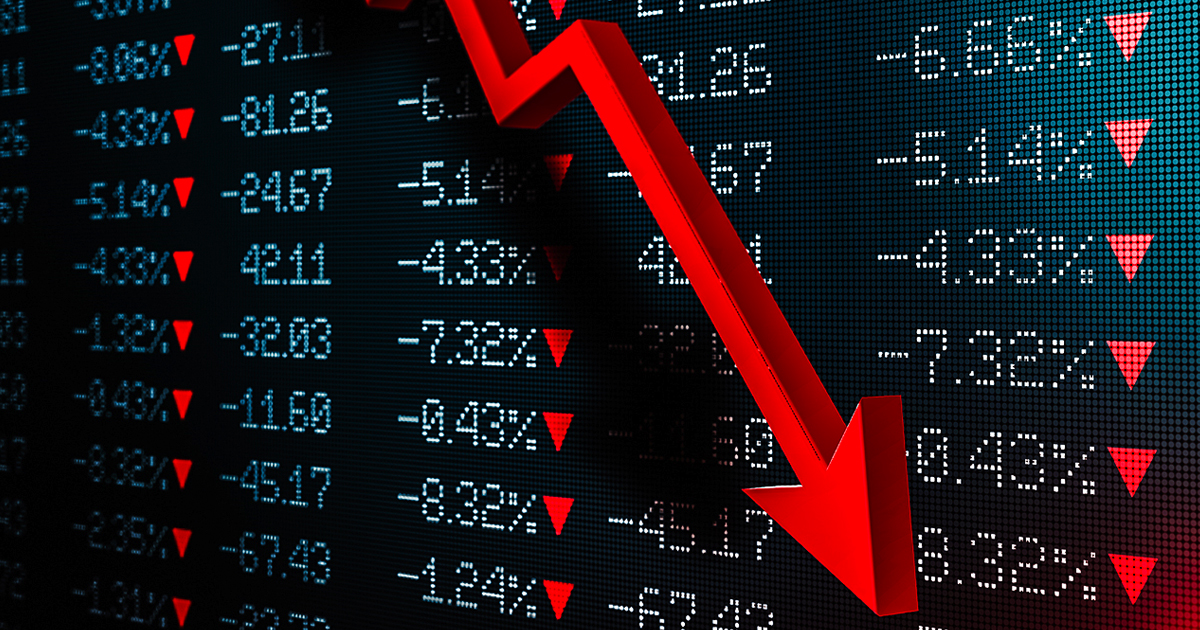Recession Fears Grow; Market Wipes Out Nearly $3 Trillion in 1 Day
05.08.2024 9:56 1 min. read Kosta Gushterov
Financial analysts say fears of a global recession have risen after a dramatic $2.9 trillion drop in stock market values.
The drop, reported on August 2, 2024, is the biggest since March 16, 2020, when the COVID pandemic sparked similar concerns.
Jacob King, a financial analyst, highlighted that major stock indices have suffered serious losses due to growing recession fears. This decline was triggered by disappointing U.S. employment data, which showed slower job growth and rising unemployment—the highest since October 2021. In addition, the weak performance of the U.S. manufacturing sector and weak earnings at semiconductor giant Intel worsened the situation.
On this turbulent day, the major world indices fell significantly. The S&P 500 index, tracking the 500 largest U.S. companies, faced its worst session in nearly two years. The Nasdaq Composite dropped 2.6%, and the Dow Jones Industrial Average fell 2%, or 820 points. Prominent technology stocks were hit hard, with Amazon shares plunging 12.5% on missed earnings expectations and a dismal forecast. Intel shares fell 29%, and Nvidia also saw a significant decline on the day.
Deutsche Bank’s Jim Reed noted that the recent decline reflects rising risk sentiment in the market, exacerbated by weak U.S. economic data and disappointing technology earnings. This global market decline underscores widespread concern about a potential economic slowdown.
-
1
U.S. PCE Inflation Rises for First Time Since February, Fed Rate Cut Likely Delayed
27.06.2025 18:00 1 min. read -
2
Key U.S. Economic Events to Watch Next Week
06.07.2025 19:00 2 min. read -
3
Gold Beats U.S. Stock Market Over 25 Years, Even With Dividends Included
13.07.2025 15:00 1 min. read -
4
U.S. Announces Sweeping New Tariffs on 30+ Countries
12.07.2025 16:30 2 min. read -
5
US Inflation Heats Up in June, Fueling Uncertainty Around Fed Cuts
15.07.2025 16:15 2 min. read
US Inflation Heats Up in June, Fueling Uncertainty Around Fed Cuts
U.S. inflation accelerated in June, dealing a potential setback to expectations of imminent Federal Reserve rate cuts.
Gold Beats U.S. Stock Market Over 25 Years, Even With Dividends Included
In a surprising long-term performance shift, gold has officially outpaced the U.S. stock market over the past 25 years—dividends included.
U.S. Announces Sweeping New Tariffs on 30+ Countries
The United States has rolled out a broad set of new import tariffs this week, targeting over 30 countries and economic blocs in a sharp escalation of its trade protection measures, according to list from WatcherGuru.
Key U.S. Economic Events to Watch Next Week
After a week of record-setting gains in U.S. markets, investors are shifting focus to a quieter yet crucial stretch of macroeconomic developments.
-
1
U.S. PCE Inflation Rises for First Time Since February, Fed Rate Cut Likely Delayed
27.06.2025 18:00 1 min. read -
2
Key U.S. Economic Events to Watch Next Week
06.07.2025 19:00 2 min. read -
3
Gold Beats U.S. Stock Market Over 25 Years, Even With Dividends Included
13.07.2025 15:00 1 min. read -
4
U.S. Announces Sweeping New Tariffs on 30+ Countries
12.07.2025 16:30 2 min. read -
5
US Inflation Heats Up in June, Fueling Uncertainty Around Fed Cuts
15.07.2025 16:15 2 min. read


